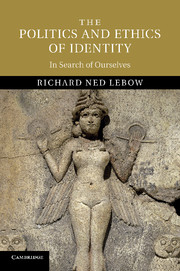Crossref Citations
This Book has been
cited by the following publications. This list is generated based on data provided by Crossref.
Bartelson, Jens
2013.
Three concepts of recognition.
International Theory,
Vol. 5,
Issue. 1,
p.
107.
Berenskoetter, Felix
2014.
Parameters of a national biography.
European Journal of International Relations,
Vol. 20,
Issue. 1,
p.
262.
Lebow, Richard Ned
2014.
The Encyclopedia of Political Thought.
p.
1766.
Fey, Marco
Melamud, Aviv
and
Müller, Harald
2014.
The Role of Justice in Compliance Behavior: Germany’s Early Membership in the Nuclear Non-proliferation Regime.
International Negotiation,
Vol. 19,
Issue. 3,
p.
459.
Lindemann, Thomas
and
Thoemmes, Jens
2015.
Épistémès temporelles et conflits armés.
Temporalités,
Reinke de Buitrago, Sybille
2015.
Regional Insecurity After the Arab Uprisings.
p.
85.
Rumelili, Bahar
2015.
Identity and desecuritisation: the pitfalls of conflating ontological and physical security.
Journal of International Relations and Development,
Vol. 18,
Issue. 1,
p.
52.
BARTELSON, JENS
2015.
Towards a genealogy of ‘society’ in International Relations.
Review of International Studies,
Vol. 41,
Issue. 4,
p.
675.
Sefa-Nyarko, Clement
2016.
History Can Bite.
p.
61.
Vieira, Marco A.
2016.
Understanding Resilience in International Relations: The Non-Aligned Movement and Ontological Security.
International Studies Review,
Vol. 18,
Issue. 2,
p.
290.
Ostermann, Falk
2016.
The discursive construction of intervention: selves, democratic legacies, and Responsibility to Protect in French discourse on Libya.
European Security,
Vol. 25,
Issue. 1,
p.
72.
Robinson, Simon
2016.
The Practice of Integrity in Business.
p.
31.
Gould, Harry D.
2016.
Contingent identities.
Global Discourse,
Vol. 6,
Issue. 1-2,
p.
313.
Strating, Rebecca
2017.
Timor-Leste’s foreign policy approach to the Timor Sea disputes: pipeline or pipe dream?.
Australian Journal of International Affairs,
Vol. 71,
Issue. 3,
p.
259.
Behr, Hartmut
and
Williams, Michael C
2017.
Interlocuting classical realism and critical theory: Negotiating ‘divides’ in international relations theory.
Journal of International Political Theory,
Vol. 13,
Issue. 1,
p.
3.
Bucher, Bernd
and
Jasper, Ursula
2017.
Revisiting ‘identity’ in International Relations: From identity as substance to identifications in action.
European Journal of International Relations,
Vol. 23,
Issue. 2,
p.
391.
Jakša, Urban
2017.
Unrecognized States and Secession in the 21st Century.
p.
35.
Berenskoetter, Felix
2017.
National identities and international relations.
Cambridge Review of International Affairs,
Vol. 30,
Issue. 5-6,
p.
577.
Müller, Harald
2017.
Richard Ned Lebow: A Pioneer in International Relations Theory, History, Political Philosophy and Psychology.
Vol. 2,
Issue. ,
p.
55.
Paipais, Vassilis
2017.
Political Ontology and International Political Thought.
p.
139.





